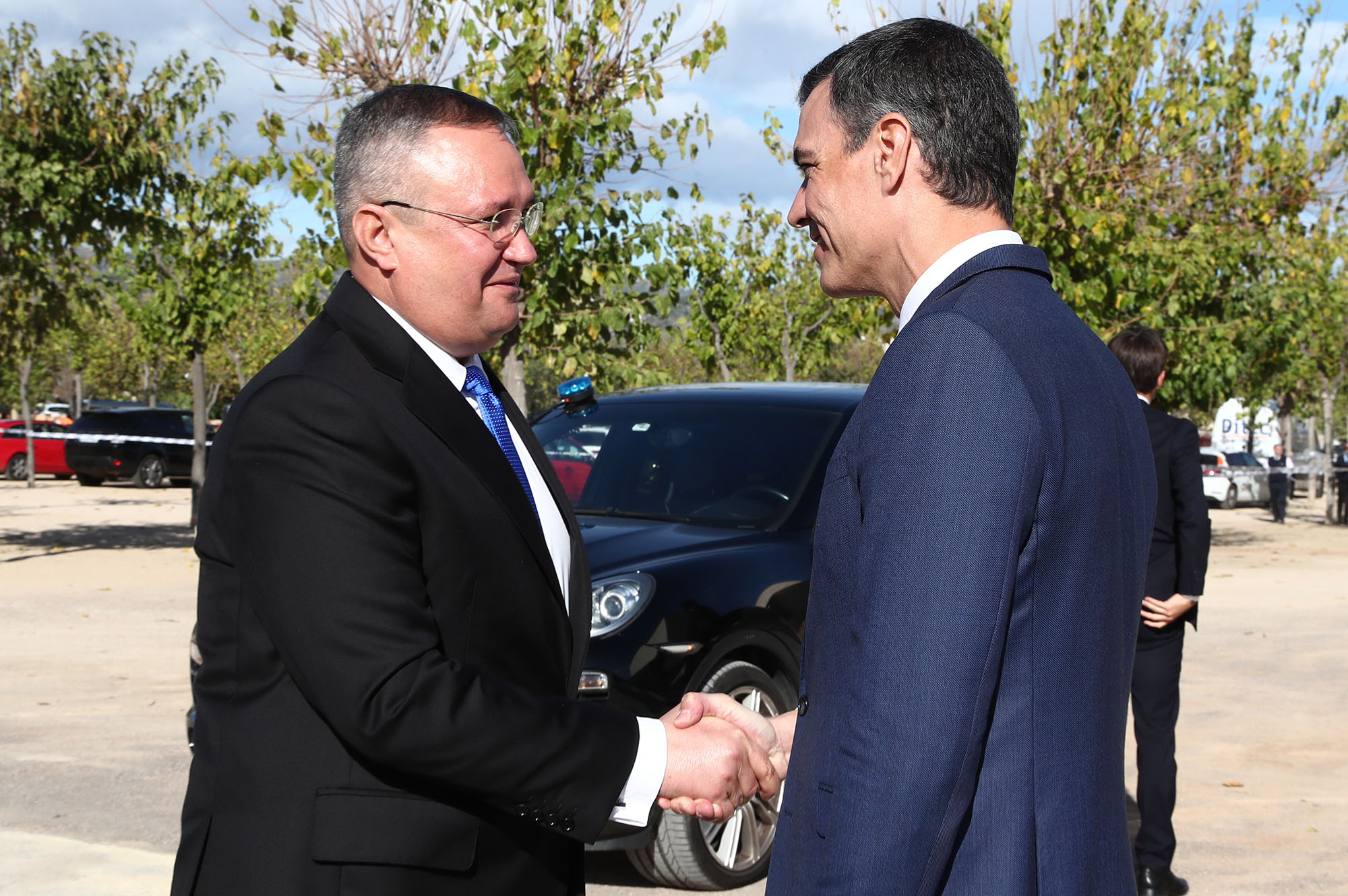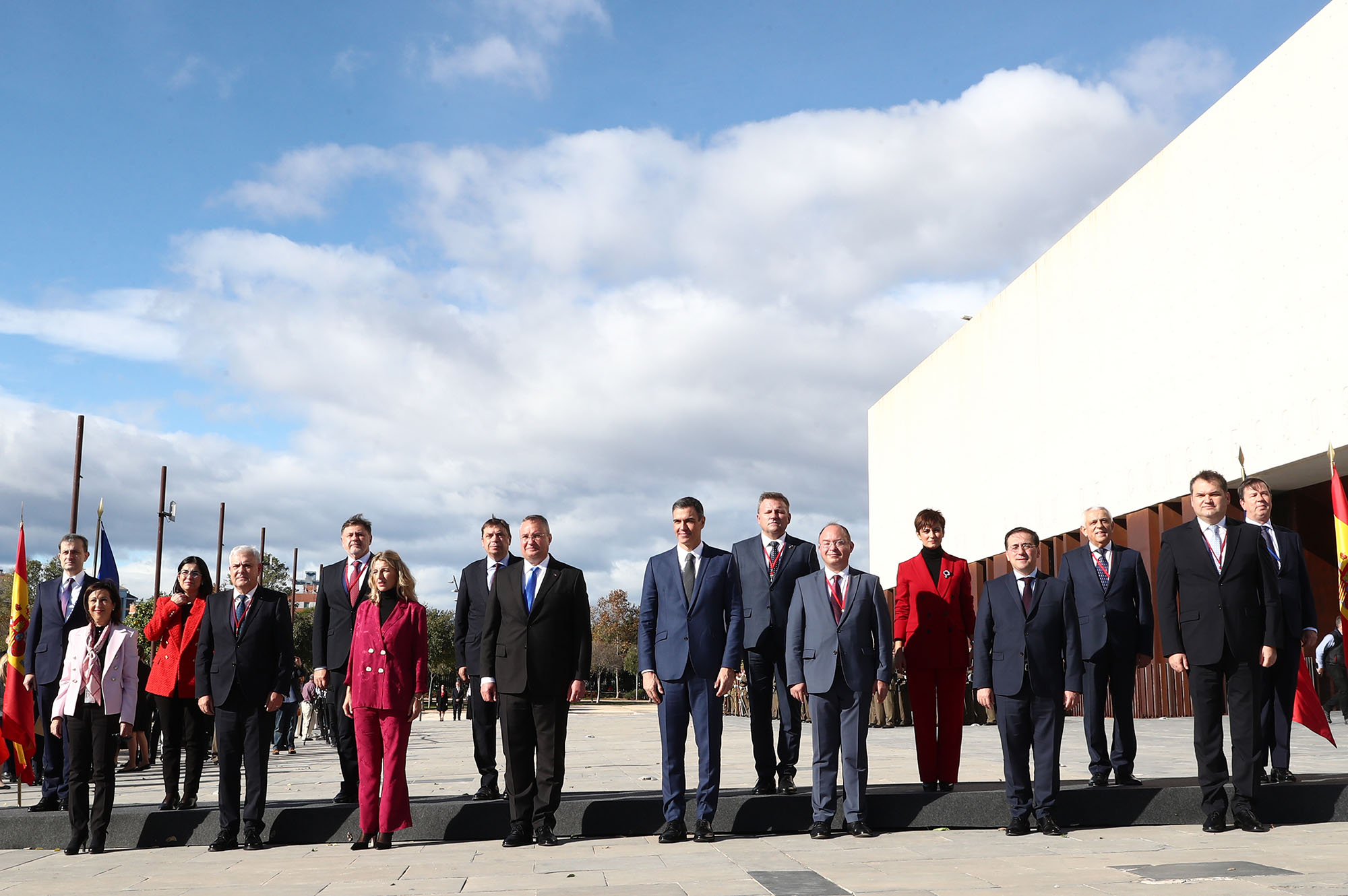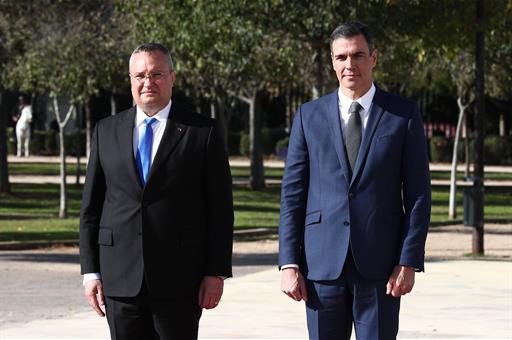1st Spanish-Romanian Summit
Sánchez assures Ciucă of the close relationship between Spain and Romania and their commitment to the European framework and security on the continent
President's News - 2022.11.23
Auditorium and Congress Center, Castellón de la Plana (Valencian Community)
President Sánchez and Prime Minister Ciucă held a meeting during which they discussed bilateral relations; issues on the European agenda such as high energy prices, economic governance, the respective recovery plans and the possible enlargement of the Schengen area; and the impact of the war in Ukraine.
The President of the Government of Spain reaffirmed that "The Latin cultural and linguistic ties between Spain and Romania, the friendship of our peoples, and the 141 years of diplomatic relations that unite us accredit the strength of an even more intense relationship since Romania joined NATO in 2004 and the EU in 2007".
As the President pointed out, bilateral relations between Spain and Romania are framed within the structure of both countries' membership of the European Union and NATO. Both share a commitment to security on the continent and solidarity with Ukraine. Sánchez and Ciucă discussed their concern for Moldova, which due to its geographical proximity is suffering particularly from the impact of Putin's war and reaffirmed their support for this country in their European horizon.
Defence relations are also close. In fact, since October this year and until March 2023, Spain has deployed an air surveillance radar and 38 military personnel at the Schitu barracks. From 1 December until next March, eight F-18 fighters and 130 military personnel will be deployed in Romania as part of the Black Sea air police mission. On the food crisis, Sánchez stressed that both leaders "welcomed the extension of the Istanbul agreement on the exit of grain through the Black Sea, which has already allowed the transit of more than 10 million tonnes".
This good relationship extends to the important ties of friendship between the citizens of the two countries. In fact, with a community of around 1,100,000 people, Romanians are the largest group of foreigners in Spain. In this regard, Sánchez highlighted the "great relevance of the decision we have taken today to create a working group to study the possibility of acquiring Spanish nationality without having to renounce their Romanian nationality of origin".
Around 300,000 Romanians visit our country every year and the Spanish language arouses great interest in Romania, with 16 bilingual sections in primary and secondary schools. To this effect, as Sánchez stressed, "our countries feel increasingly close and have a stronger relationship".
On energy, Sánchez and Ciucă shared their concerns about rising energy prices and the urgent need for measures to regulate the electricity market and the gas prices borne by businesses and households. During their meeting, the two leaders reaffirmed their commitment to a Europe without internal borders. To this end, the President of the Government of Spain ratified before the Romanian Prime Minister Spain's support for Romania's incorporation into the Schengen area.
 The President of the Government of Spain, Pedro Sánchez, receives the Prime Minister of Romania, Nicolae-Ionel Ciucă, upon his arrival at the 1st Spanish-Romanian Summit | Pool Moncloa/Fernando Calvo
The President of the Government of Spain, Pedro Sánchez, receives the Prime Minister of Romania, Nicolae-Ionel Ciucă, upon his arrival at the 1st Spanish-Romanian Summit | Pool Moncloa/Fernando Calvo
Economic and trade relations
Economic relations between the two countries have increased from €200 million per year in the 1990s to €4.2 billion in 2021. In the same year, Spanish exports reached just over €2 billion. Spain ranks 10th in direct investment in Romania (with a stock of 598 million), in the automotive, construction, energy and retail trade sectors.
Spanish companies are major Romanian public procurement contractors, with more than €4 billion to be awarded between 2007 and 2022. During his speech, the Chief Executive stressed that the two leaders had also discussed "the need to reinforce stability and legal security for companies that establish themselves in Spain and Spanish companies that go to Romania, of which there are an increasing number".
"The content of this summit has made it an intense one. We came out of it even more convinced about prioritising everything that unites our two countries, with a geographical distance that is not so great if we think of the human, cultural and emotional ties that unite us," concluded the President of the Government of Spain.
Spain and Romania sign a Joint Declaration and seven MOUs
The President of the Government of Spain and the Prime Minister of Romania have demonstrated the excellent relations between the two countries by agreeing on a Joint Declaration in which Spain and Romania undertake to continue strengthening their bilateral relations and to strengthen their ties in all areas by holding regular bilateral summits.
 Family photo of the members of the Spanish and Romanian governments participating in the 1st Spanish-Romanian Summit | Pool Moncloa/Fernando Calvo
Family photo of the members of the Spanish and Romanian governments participating in the 1st Spanish-Romanian Summit | Pool Moncloa/Fernando Calvo
During the Summit, the President of the Government of Spain was accompanied by the Second Vice-President of the Government of Spain and Minister for work and Social Economy, Yolanda Díaz; the Minister for Foreign Affairs, European Union and Cooperation, José Manuel Albares; the Spanish Minister for Defence, Margarita Robles; the Spanish Minister for Agriculture, Fisheries and Food, Luis Planas; the Spanish Minister for Territorial Policy, Isabel Rodríguez; and the Minister for Health, Carolina Darias. Ministers from the two countries have signed several Memoranda of Understanding in their areas.
The purpose of the Working MoU is the exchange of information and best practices and coordination on European issues. In Foreign Affairs, the Memorandum aims to promote regular political consultations on issues such as political, economic, cultural, scientific and consular relations European policies, NATO, multilateral fora and development cooperation. In addition, a cooperation agreement has been signed between the diplomatic schools of the two countries.
In terms of Home Affairs, a document has been signed to reduce the risk of natural disasters in the two countries and to facilitate emergency operations. The Minister of Agriculture has signed a MOU with his counterpart that provides for cooperation in areas such as livestock and plant health, fertilisers and phytosanitary products, efficient use of water and energy in irrigation systems and digital transformation of the agri-food sector.
The Culture MOU focuses on cultural cooperation and the promotion of joint projects. In Health, the MOU aims to achieve the highest standards of health care and to collaborate on the prevention and integrated management of non-communicable diseases such as diabetes, cardiovascular diseases and cancer, and communicable diseases, including SARS-COV2 infection.
Non official translation
More Info
- Joint declaration Spain-Romania (PDF)
- Isabel Rodríguez and her Romanian counterpart pledge to coordinate their position on depopulation in the EU (2022/11/23)
- Luis Planas and Romanian Minister for Agriculture discuss food security and sustainability issues (2022/11/23)
- Work and Social Economy strengthens collaboration with Romania with the Labour Inspectorate and SEPE (2022/11/23)





